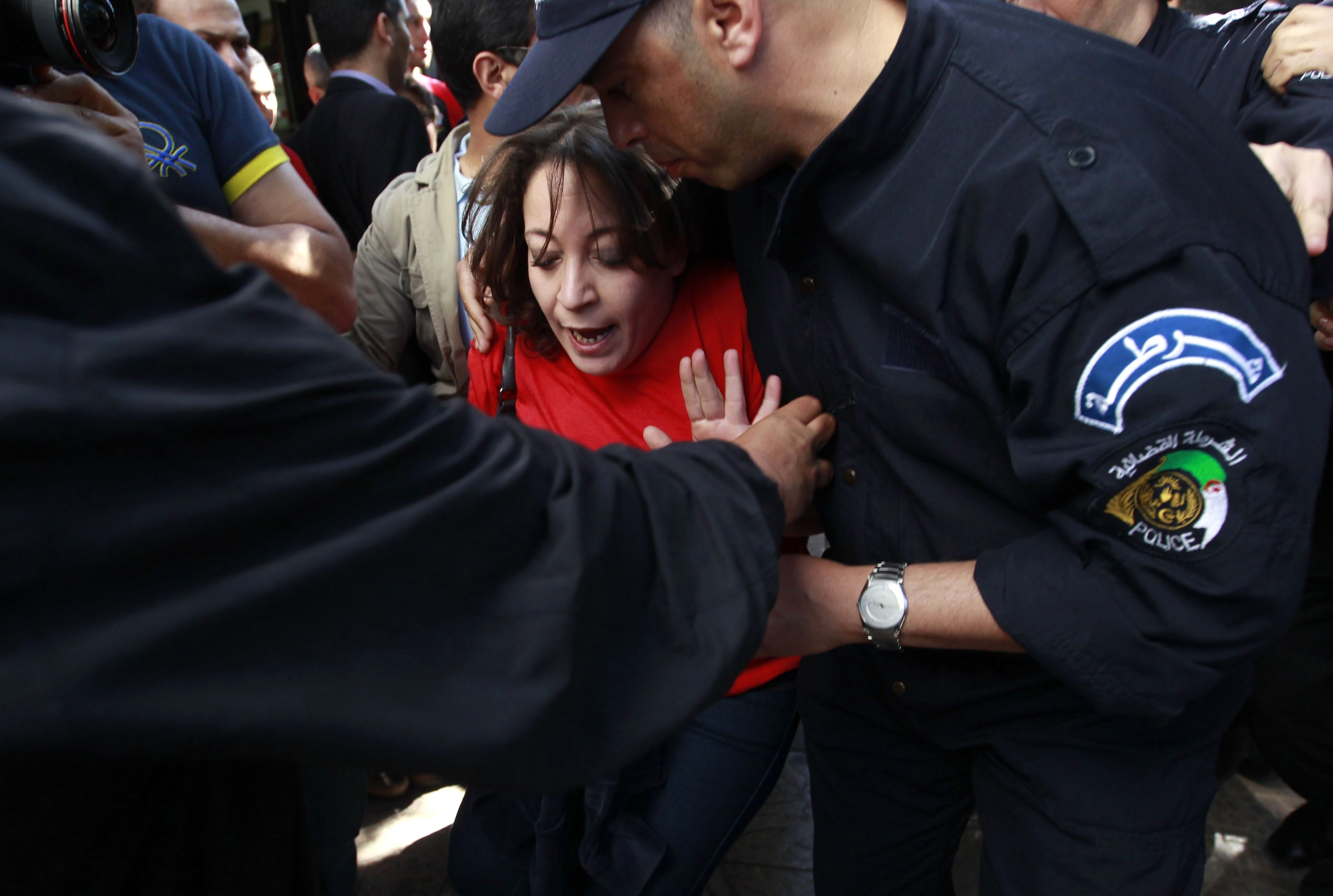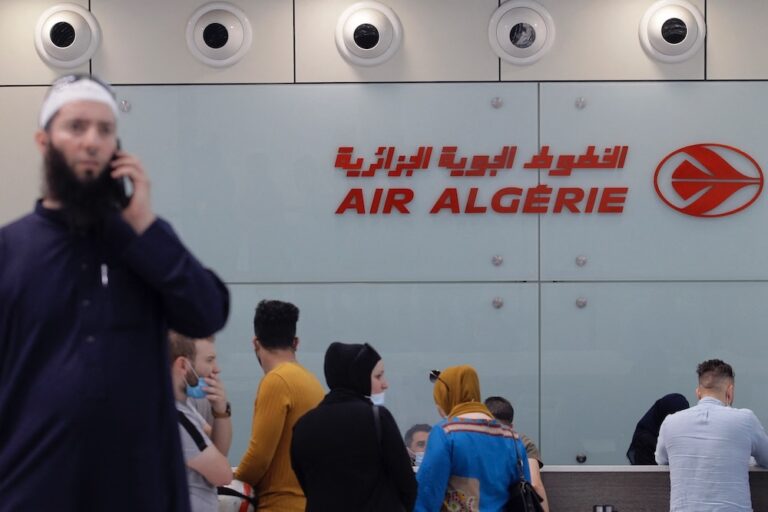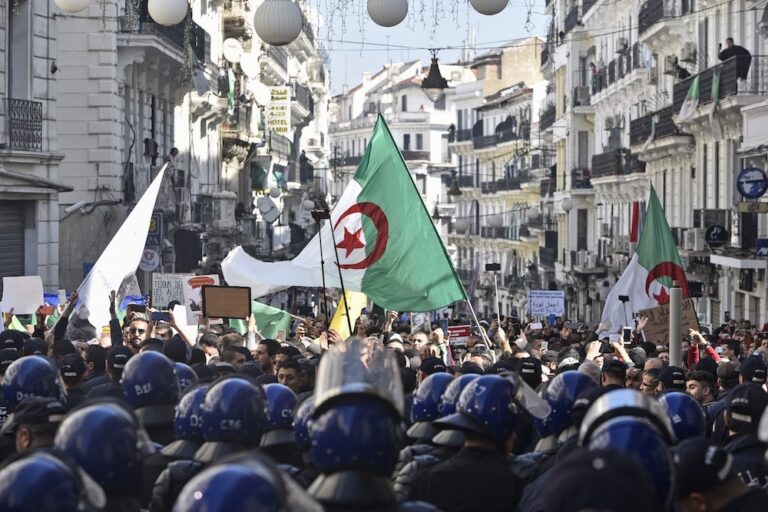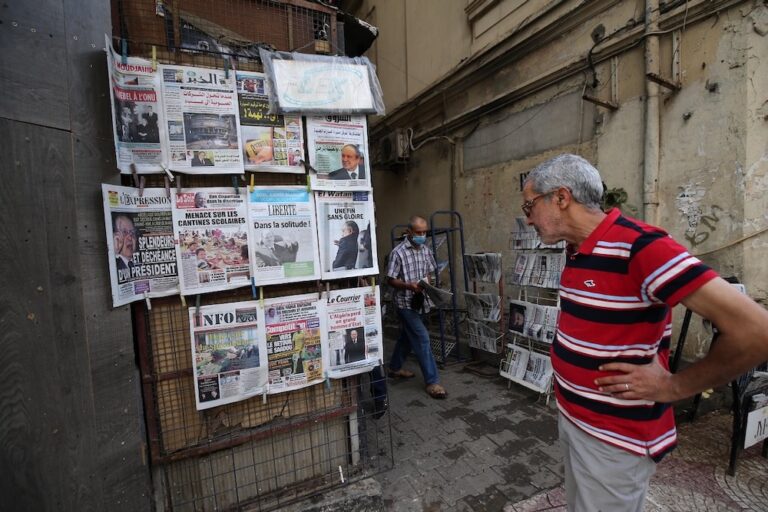Algerian authorities on the eve of the 17 April 2014, presidential election forcibly dispersed a demonstration against a fourth term for President Abdelaziz Bouteflika.
Algerian authorities on the eve of the April 17, 2014, presidential election forcibly dispersed a demonstration against a fourth term for President Abdelaziz Bouteflika. The authorities should abandon such repressive practices by rescinding the 2001 decree banning all demonstrations in Algiers, the capital, and by allowing people to exercise their right to peaceful assembly anywhere in Algeria.
The violent crackdown brings into focus the repressive tactics commonly used by the security forces. However, in the period leading up to the election, the authorities have responded unevenly to demonstrations. Since mid-March, they tolerated several public rallies in Algiers. Those included some organized by groups that favored boycotting the election and by others united under the banner of Barakat (Enough), a movement opposed to a fourth term for the president. In several cities, police forces merely stood alongside the protest marches without intervening. Before mid-March, the security forces had systematically blocked or dispersed the Barakat, or the pro-boycott activists who tried to demonstrate in Algiers, forcibly hauling them into police vans and releasing them a few hours later.
“Algerians who experienced a short period of respect for peaceful protest were rudely brought back to reality by the police brutality on April 16,” said Eric Goldstein, deputy Middle East and North Africa director at Human Rights Watch. “In the post-election period, officials need to end the blanket ban on demonstrations in the capital, which says so much about the lack of basic freedoms in Algeria.”
Several Barakat activists told Human Rights Watch that police stopped them as they walked down Didouche Mourad Avenue at about 4 p.m. on April 16, heading toward Audin Square and the Algiers University campus, where the movement planned a sit-in. They said the police detained them for as much as an hour on the staircases of nearby buildings.
Amira Bouraoui, one of the activists, said:
We had decided to walk down Didouche Mourad Street in small separate groups, to avoid being arrested. I was with a group of a dozen activists. Thousands of police officers were posted all along the street. Suddenly, about 20 uniformed and plainclothes policemen rushed toward me, grabbed me and hit me in the heels and legs, then forcibly dragged me inside a building on Didouche Mourad Street. One of them was insulting me, calling me a “dirty Jew,” a “harki” [a reference to Algerians who took France’s side during the war of independence, and are considered traitors and collaborationists], and a “whore.” In the building were two other activists, Mustapha Benfodil and Mustapha Moussaoui. I saw that the police had beaten them up, too. As I am a doctor, I could spot bruises on their legs and heels, and on their shoulders.
Idir Tazerout, a journalist and a member of the Barakat’s coordination committee, said:
As I was walking down Didouche Mourad Street toward the Algiers University campus, the cops rushed toward me and several other prominent members of the movement, as if they had located us in advance. I was surrounded by a dozen cops, they kicked me in the legs and one of them punched me in the face. They tripped me to the ground, and then, while insulting me, they dragged me toward a building where they locked me up for an hour, before releasing me. I tried to join my friends down the street but other police officers again rushed toward me to isolate me, and they started to beat me up again.
In contrast to the April 16 police response, activists from the Barakat movement were able to hold a sit-in protest for several hours on March 15 in front of Algiers University, without any forceful intervention by the security forces who, up to then, had systematically dispersed and arrested protesters.
Similarly, the Barakat movement organized a march in the city of Bejaïa, on April 2, in which it says about 200 people took part, and another in Annaba on April 3 with about the same number of participants. In both cases, security forces stood by the march without intervening.
The provincial authority of Algiers also gave permission to the pro-boycott coalition for a meeting on March 21 in Harcha Hall in Algiers. The coalition is made up of five opposition political parties, the Movement of Society for Peace (MSP) (Mouvement de la société pour la paix), the Rally for Culture and Democracy (RCD) (Rassemblement pour la culture et la démocratie), the Justice and Development Front (FJD) (Front pour la justice et le développement), Ennahda (the Awakening), and Jil Jadid (New Generation), and Ahmed Benbitour, who withdrew his candidacy for the presidential election.
During the first week of March, security forces arbitrarily arrested supporters of the Barakat movement at least three times, as they expressed their opposition to a fourth term for Bouteflika. Similarly, RCD President Houcine Belabbès told Human Rights Watch that police officers had surrounded the area of the Martyrs Memorial on the heights of Algiers, preventing boycott coalition leaders from reaching the site, where they had planned to hold a rally on March 12.
Media reported other incidents in places where anti-Bouteflika demonstrations disturbed or prevented campaign meetings of the Bouteflika re-election team. In Bejaïa on April 5, for example, protesters surrounded the local cultural center where Abdelmalek Sellal, Bouteflika’s campaign manager, was to hold a meeting, and damaged and set fire to parts of the building. Authorities have an obligation to prevent and punish those responsible for acts of violence and acts that aim to deny other people the exercise of their rights, but this should under no circumstances justify widespread repression of the right to peaceful assembly, Human Rights Watch said.
Algeria’s 89-28 Law Governing Public Meetings and Demonstrations, enacted in 1989 during a period of political and legal liberalization, was amended by parliament in 1991, when the country was experiencing massive protests and occasionally violent clashes between anti-government demonstrators and the security forces. Authorities imposed the ban on all demonstrations in Algiers on June 18, 2001, four days after a huge march in Algiers focusing on the rights of the Amazigh, or Berber, ethnic group. The protest drew participants from all over the Amazigh-majority Kabylia region and resulted in some looting of shops and clashes involving the police, demonstrators, and local youths. Authorities did not rescind the ban when they lifted the 19-year-old state of emergency in 2011.
The 1991 law significantly reduced the right to assemble and to hold meetings. Under the law, a group planning a public gathering must seek authorization from the governor three days in advance. The law defines a “public meeting” as a gathering inside an enclosed public space, out of public thoroughfares and spaces, “with the aim of promoting common interests or of exchanging ideas.”
The law defines public demonstrations as “processions, parades or gatherings of people and, generally, all exhibitions on public roads” and says organizers must request an authorization from the governor at least eight days in advance. The governor is supposed to immediately deliver a receipt and to give his written authorization or refusal at least five days before the demonstration date. However, in practice the administration has often failed to deliver the receipt, leaving organizers unable to prove they submitted their request in time.
Under the law, the administration may prohibit any gathering “by informing its organizers that it seems to constitute a real risk of disturbing the public order, or that it seems clear that the real objective of the meeting constitutes a danger to maintaining the public order.” Authorities are not obligated to explain their decision.
The law prohibits “any assembly or demonstration to oppose ‘fundamental principles’ [constantes nationales],” or “to cause any harm to the symbols of the revolution of November 1st [the date of the start of Algeria’s war of independence against French colonial rule], the public order or public morals.” Organizers may appeal a denial of permission for an assembly to an administrative court.
Article 21 of the International Covenant on Civil and Political Rights (ICCPR), states:
The right of peaceful assembly shall be recognized. No restrictions may be placed on the exercise of this right other than those imposed in conformity with the law and which are necessary in a democratic society in the interests of national security or public safety, public order (ordre public), the protection of public health or morals or the protection of the rights and freedoms of others.
International law allows only limited restrictions on the right to peaceful assembly, which should be narrowly defined; any restrictions need to be proportionate and are only allowed to the extent they are strictly necessary. A complete and indefinite prohibition on peaceful assembly, especially in the capital city, is a violation of the ICCPR.
“It is urgent for Algerian authorities to reform these repressive laws and to abolish the 2001 decree banning all demonstrations in Algiers,” Goldstein said.
“I was surrounded by a dozen cops, they kicked me in the legs and one of them punched me in the face.”
“They tripped me to the ground, and then, while insulting me, they dragged me toward a building where they locked me up for an hour.”
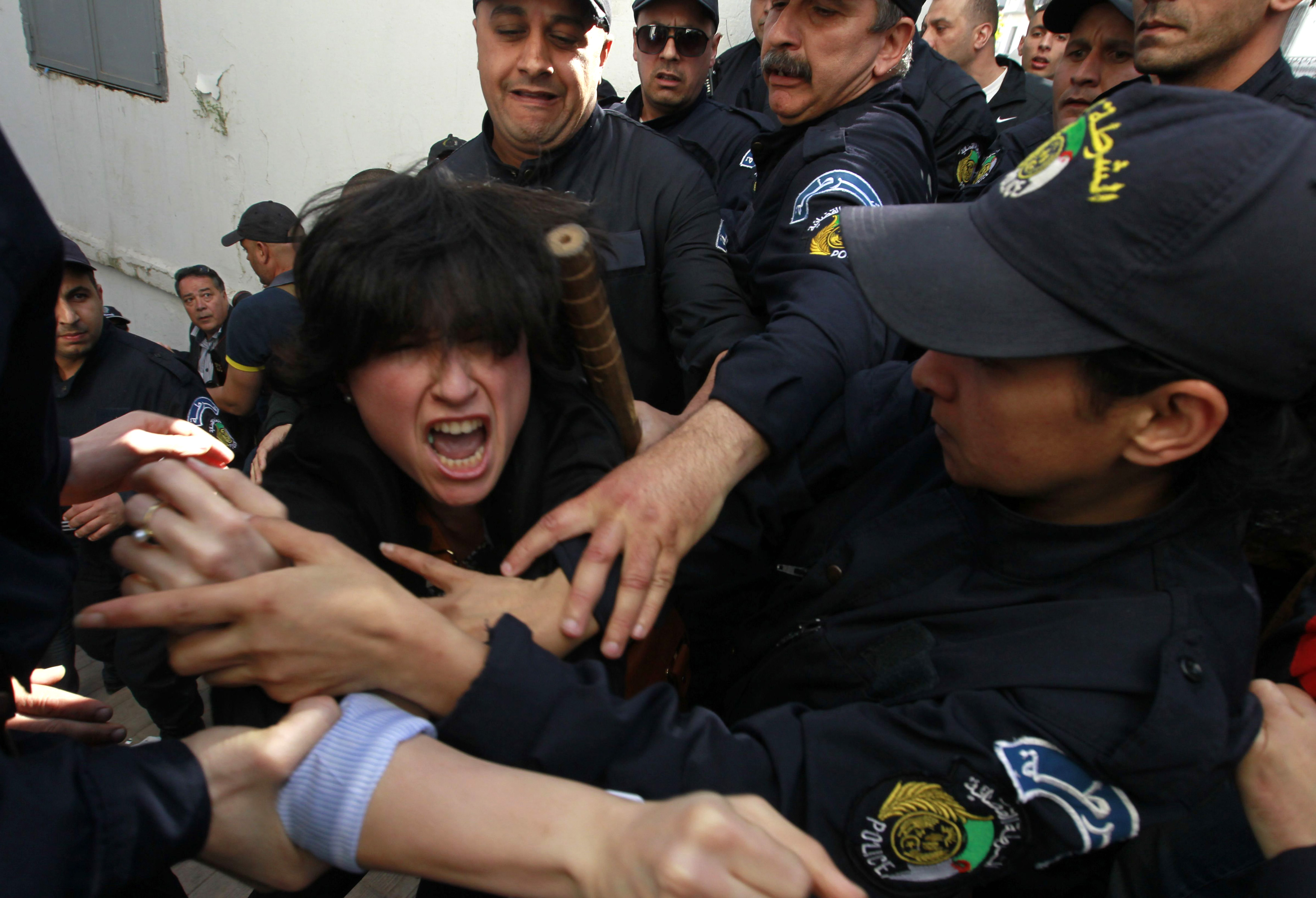
Police officers detain a protester during a demonstration against Algerian President Abdulaziz Bouteflika’s decision to run for a fourth term, in Algiers 16 April 2014REUTERS/Louafi Larbi
